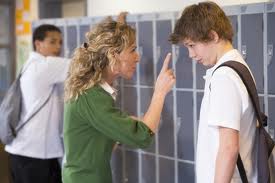Our children go through many stages while growing up, but as parents, there are three distinct roles that parents have during this time.
• From birth until about age 7 (when our kids go from learning to read, to reading to learn) our role is to be their “teacher”. We teach them to talk and walk, read and write, and we teach them how to live in our society.
• From then until they hit puberty, our role shifts to become their “manager”. We manage their schedule ~ appointments, activities, school work ~ we oversee their lives. For many parents, this is their favorite time. They get to be in charge and their kids still like them.
• When most kids hit puberty, they fire their manager and they become “unmanageable”. This is the time when our role as parent changes again. At this age, our children are ready to begin the arduous journey of learning to become adults. Our job is to help them learn how to do this. Now we get to become a resource for them. We get to be their “mentor” (read: “Learn how to become your teenagers ‘life coach’”).
Sounds simple right? Why doesn’t it happen that way? Why do teenager’s have a reputation for being so darn difficult? When you were a teen, did you have someone who mentored you into adulthood? For most of us, the answer to that is a resounding “NO”. Parents have a tendency to “parent the way we were parented” so how would we know that a shift in our role is even possible? Most of us do what our parents did ~ try harder to control our kids. But…the harder we try to control them, the more they resist…the more unmanageable they become. They become “difficult” to deal with and pretty soon, they have even stopped talking to us and roll their eyes, grunt, sigh, or show some other sign of disgust whenever we try to talk to them.
In the coming weeks we will explore some ways to begin to shift this relationship as you move into your changing role as your teenager’s mentor and life coach. In the meantime, here are some ideas (that will be expanded on in the next post) to consider:
• Kids learn respect by being treated with respect. Treat them with the kind of respect that you want to be treated with. You set the standard (and the example) that you expect them to comply to.
• Pay attention to the way you talk to/treat your kid. Ask yourself, “How would I feel if someone talked to/treated me this way?” If your answer is, “I wouldn’t like it,” chances are, your kid doesn’t like it either.
• NEVER engage in a power struggle with your teenager (most parents don’t even win power struggles with their 2 year olds). We’ll talk about how to get out of power struggles next week.
Want more practical tips and techniques? My next workshop starts May 24, 2011. Get the details and register on my Upcoming Workshops page.


